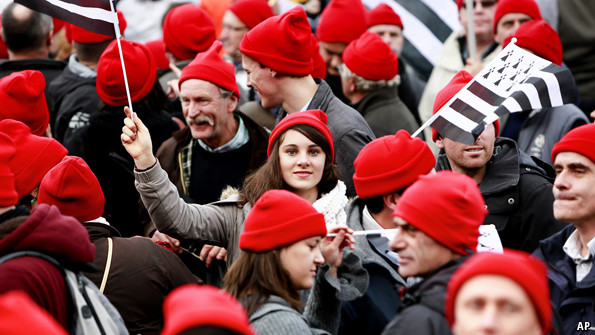
ON PAPER, he is one of the most powerful leaders in the Western world. Under the French constitution President François Hollande can dispatch troops abroad, as he is about to do in the Central African Republic (CAR), conduct foreign affairs as he pleases, and dissolve parliament as he sees fit. Moreover, his Socialist Party controls all levels of government, from the senate down to a majority of local councils. In diplomacy, Mr Hollande has indeed turned out to be as decisive in his exercise of power as the constitution allows. Yet, on the domestic front, he behaves with ever-shrinking authority.
In January an unexpectedly hawkish Mr Hollande dispatched 4,500 French soldiers and fighter jets to Mali, to push back an incursion in the north by rebels linked to the local branch of al-Qaeda; 2,800 French troops are still on the ground there. More recently, Mr Hollande had his jets on alert, ready to strike targets in Syria, before America’s president halted matters by deciding to consult Congress first. France’s foreign minister, Laurent Fabius, then took a tougher line in the latest negotiations with Iran than the Americans did, insisting on pushing for further concessions and delaying the final deal.
Now Mr Hollande is preparing to send some 1,000 French soldiers to the CAR, where lawlessness and violence, in Mr Fabius’s words, “borders on genocide”. The French have drafted a resolution for the United Nations Security Council, which could go to a vote in early December, to authorise a UN peacekeeping force. This could support African regional peacekeepers already there, and operate with French military backing. Jean-Yves Le Drian, the defence minister, says that he expects the French intervention in the CAR, which will add to the 400 or so French soldiers already guarding the capital’s airport, to last six months.
As the French prepare for yet another foreign military adventure, there is much head-scratching about how such a decisive war leader can be so ineffective domestically. Mr Hollande’s decidedly shaky grip on governing at home has been underlined by two recent episodes.
The first was his ill-judged decision in October to intervene, via a live televised address to the nation, in a court order to deport Leonarda Dibrani, an illegally resident Roma school pupil, back to Kosovo. Reacting to an outcry about the deportation, and faced with the decision either to uphold the law or flaunt it, Mr Hollande chose a third way with an offer to let the under-aged Ms Dibrani return to school in France—but without her family. This satisfied nobody, and exposed the president as an indecisive meddler.
At the same time, a bigger revolt broke out, this time over taxes. In anticipation of a new “eco-tax”, which was to be a charge on big lorries using main roads in an effort to discourage road freight, furious truckers in Brittany began commando-style attacks on automatic toll sensors. The burning and smashing-up of the sensors spread; the western Peninsula of Brittany fast became the centre of a popular revolt against taxation that drew an improbable mix of farmers, local business bosses and nationalists. In a clever propaganda coup, they adopted red woolly hats, or bonnets rouges, in a nod to the headgear worn during a 1675 uprising in Brittany against taxes imposed by Louis XIV.
The fiscal revolt took the government by surprise. The French are famously tolerant of high taxes, regarding them as part of a social pact that secures them good public services in return. Yet that pact has been put to the test by several years of tax increases. Even Pierre Moscovici, the finance minister, recognised that the French had “had it up to here” with higher taxes.
The government promptly backed down on the eco-tax, with Jean-Marc Ayrault, the prime minister, declaring it “suspended”. This was the third retreat on a new tax this autumn. What made this surrender such an emblem of Mr Hollande’s diminished authority was that it was not a mere proposal but written into law, and had passed with cross-party parliamentary support.
Mr Hollande’s options are now limited. His approval rating sank to 20% in November, the lowest since Ifop, a polling group, started measuring presidential popularity in 1958. The economy shrank again in the third quarter. The president’s team argues that it will take time for its efforts, on public finances and competitiveness, to bring results, and that patience will pay off.
But fretful Socialist deputies want a firmer hand now. One has urged a change of prime minister; yet it would be hard to find a pliant successor to the plodding but loyal Mr Ayrault. Others have called for parliament to be dissolved. For now, the strategy seems to be to try to restore the prime minister’s authority, thanks to a grand “fiscal rethink”. This idea was cooked up by Mr Ayrault. Mr Hollande said that this could take years; Mr Ayrault has begun consultations.
Whatever relief this rethink brings may prove short-lived. Mr Ayrault says the idea is to make the French tax system “fairer”, but also that he will keep the overall tax take at the same level. And rejigging the system to help the worse-off is likely to mean higher taxes for the rest, including the squeezed middle. Above all, it means yet more uncertainty about French taxes, at a time when their unpredictability is already a worrying deterrent to investment and confidence.